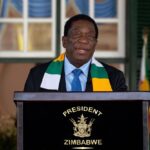The political landscape in Zimbabwe is heating up as President Emmerson Mnangagwa has seemingly abandoned the controversial “ED2030” campaign, a move that has sparked a fierce response from Vice President Constantino Chiwenga.
Mnangagwa, speaking at the Zanu PF National Assembly of the Youth League in Harare, declared his commitment to upholding the national constitution and respecting its term limits. “Besides being a soldier, I am a trained lawyer. I am a constitutionalist,” he said. “I want our party, our leadership, our people to be constitutionalists. We must abide by the provisions of our constitution to the letter. Kana nguva yekuti uende [yakwana], enda.” (If your time to go comes, leave.)
This announcement comes as a surprise to many within Zanu PF, who had been pushing for Mnangagwa to remain in power beyond 2028, the end of his second term. Last month in Mutare, Mnangagwa had already hinted at his impending departure, stating, “I did my first five years, so I am serving my last five years, which I will complete soon, and I will go to rest. We will go to Congress and look for someone who will succeed me. My days to rest are close; we will go to Congress and choose the one who will follow in my footsteps.”
However, despite Mnangagwa’s pronouncements, several Zanu PF provincial branches have been lobbying for him to extend his rule, citing the need to oversee the completion of various developmental projects.
While some have expressed skepticism about Mnangagwa’s commitment to the constitution, pro-ZANU-PF political commentator Kudzai Mutisi believes that the President will not follow in the footsteps of his predecessor, Robert Mugabe, who ruled for nearly 40 years. “What is important here is that he is addressing some of the people who have been lobbying him to stay beyond 2028,” Mutisi said. “So whatever people have been saying or whatever people have been thinking has nothing really to do with him, it is what they, as lobbyists, they as commenters have been brewing their heads and voicing out, but what we heard is the president’s voice, the president’s position and that’s what we should respect and stick to as we go forward.”
However, others, like lawyer Brighton Mutebuka, remain unconvinced. “By coming out publicly to claim otherwise, ED is trying to hoodwink the gullible in his party, the other faction and also SADC,” Mutebuka said. “And mind you, he has previously himself come out publicly and corralled his Cabinet ministers into pledging loyalty to this 2030 slogan, in Chikomba district.”
The debate over Mnangagwa’s intentions has been further fueled by the recent actions of Vice President Constantino Chiwenga. In a clear sign of his growing discontent with the “ED2030” campaign, Chiwenga has openly criticized the rise of personality cults, power pursuits, and factionalism within Zanu PF.
Chiwenga, who has notably refrained from endorsing the “ED2030” slogan, stressed that loyalty should lie with the party and the people of Zimbabwe, not with individual leaders. “There is no room for factionalism at any level in the party,” Chiwenga stated. “Our loyalty is not to individuals but to the bigger agenda, that of the party and the people of Zimbabwe who are supreme.”
His comments have been interpreted as a direct challenge to Mnangagwa’s intensifying “ED2030” campaign. Mnangagwa and Chiwenga are reportedly engaged in a fierce power struggle over ZANU PF’s unresolved leadership and succession issues, which have intensified as the former attempts to extend his rule beyond the 2028 constitutional term limit to 2030.
UK-based Zimbabwean lawyer, Brighton Mutebuka, recently claimed that there is a looming “final showdown” between Mnangagwa and Chiwenga over the control of the ruling ZANU PF party and the Zimbabwean government. “ED is going nowhere. Battle lines are now drawn everywhere. In SADC, in ZANU PF and all state institutions. The unfinished business of November 2017 has returned to haunt Zimbabwe. The showdown is looming,” Mutebuka wrote.












